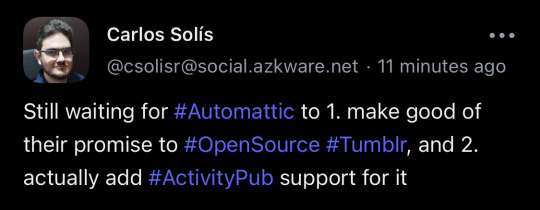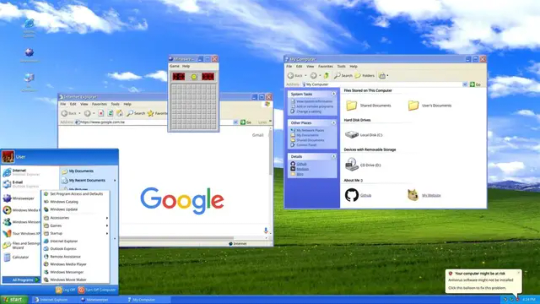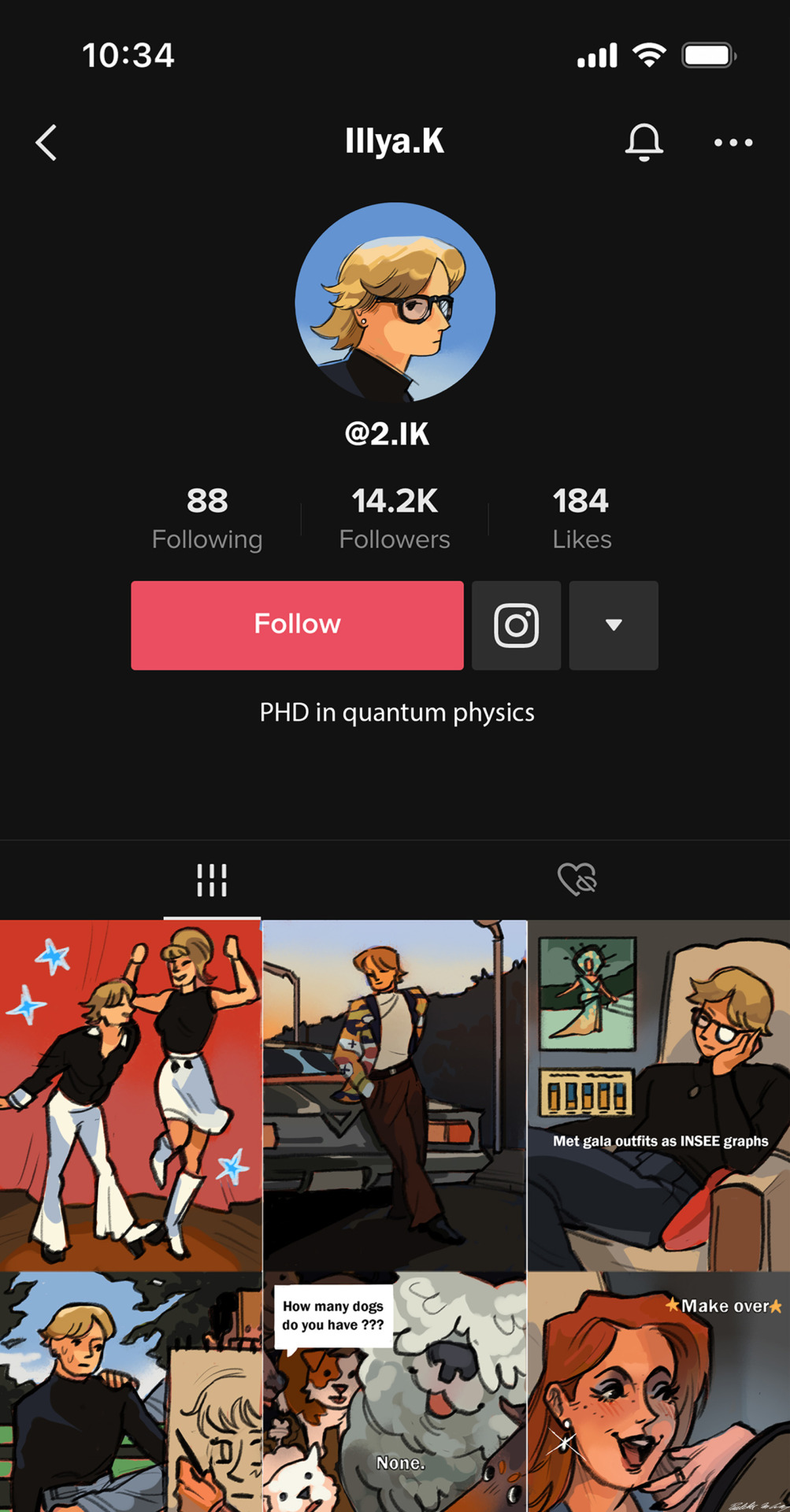#OSS technologies
Explore tagged Tumblr posts
Text
Cutting-Edge OSS -Olatech Solutions
Olatech Solutions specializes in cutting-edge OSS technologies, offering tailored IT and software services to enhance business efficiency and innovation.
0 notes
Text
girl help the Computer People interacting with my previous posts are ignoring the point I was trying to make and waxing poetic about their favorite open-source operating system setups
#technology#the point was that people who are Very Into Computers tend to use way more technical jargon than casual ordinary users can keep up with!#but of course Computer People fixated on the literal contents of the post I screencapped#and are critiquing that particular poster’s linux preferences 😭#mention OSS in front of five users and get seven detailed opinions#god bless
129 notes
·
View notes
Text
The Secret Labs of WWII: Innovations in Warfare
World War II was a conflict fought on battlefields, in the skies, and across the oceans. But it was also a war fought in the shadows, in laboratories hidden away from prying eyes, where brilliant minds raced against time to develop technologies that could turn the tide of the conflict. These “secret labs” were hotbeds of innovation, where scientists, engineers, and researchers worked on projects…
#Allied secret weapons#Axis secret technology#biological warfare WWII#Blackwood war history#Bletchley Park codebreaking#cryptology WWII#Dora-Mittelbau factory#ethical implications of wartime research#hidden wartime science#Manhattan Project locations#military R&D WWII#MIT Rad Lab#nuclear weapons development#OSS spy gadgets#Peenemünde rocket development#Porton Down research#radar technology WWII#SOE workshops#top secret facilities#underground factories WWII#Unit 731 experiments#V-2 rocket history#wartime scientific innovation#WWII Secret Labs. Secondary and long-tail keywords: World War 2 secret research
0 notes
Text
even in Linux distros where 90% of things work out of the box, you're still gonna have to configure shit in the command line and this is why the entire Linux ecosystem will never catch on with normies
#technology#in order to turn on pan/scroll for my tablet pen button in my Pop partition I had to activate it in the terminal with xsetwacom#in a perfect world everyone would use Linux and all OSs would be open-source#the average user ten years ago looked at a command line terminal and shrank away in fear#the average user today doesn't know what a file directory is
0 notes
Text
Telecentro Argentina Expands Use of Netcracker Digital OSS and Critical Support Services in Multi-Year Engagement Across All Lines of Business
South American Operator Will Benefit From Improved Business Continuity, a Future-Proofed IT Environment and a Strong Foundation for Continued Growth.
Netcracker Technology announced today that Telecentro Argentina has committed to a multi-year engagement that will give the operator a stable IT platform and support and maintenance services as it plans for additional capabilities and improvements to benefit its business and customers.
Telecentro Argentina, which delivers key services including broadband, telephony and video to B2C and B2B customers and controls an extensive fiber network, will continue to leverage Netcracker Digital OSS – part of Netcracker Digital Platform – to support future growth and the ability to deliver an improved overall experience across all lines of business.
Read the full post about Netcracker digital OSS and critical support services here.
0 notes
Text
Update: Still no actual timeline, but now to coincide with WP migration.

hey staff, how’s it going with this? it has been 4 years. can we hang out with my fediverse friends?
867 notes
·
View notes
Text
Rise in cloud adoption across various industry verticals and surge in 5G adoption drive the growth of the global cloud OSS BSS market. In addition, the demand for convergent billing systems supplements the growth. However, lack of technical proficiency to carry out implementation of cloud-native OSS BSS solutions restrains the market growth.
1 note
·
View note
Text
Unveiling the power of OSS technologies
Since developing an OSS technology will require collaboration and knowledge sharing, NEC establishes an OSS technology Center in India. The center is equipped with resources like skilled software developers who are the backbone of OSS projects. They will help in developing the following components of an OSS solution.

0 notes
Note
Hello! First, I wanted to say thank you for your post about updating software and such. I really appreciated your perspective as someone with ADHD. The way you described your experiences with software frustration was IDENTICAL to my experience, so your post made a lot of sense to me.
Second, (and I hope my question isn't bothering you lol) would you mind explaining why it's important to update/adopt the new software? Like, why isn't there an option that doesn't involve constantly adopting new things? I understand why they'd need to fix stuff like functional bugs/make it compatible with new tech, but is it really necessary to change the user side of things as well?
Sorry if those are stupid questions or they're A Lot for a tumblr rando to ask, I'd just really like to understand because I think it would make it easier to get myself to adopt new stuff if I understand why it's necessary, and the other folks I know that know about computers don't really seem to understand the experience.
Thank you so much again for sharing your wisdom!!
A huge part of it is changing technologies and changing norms; I brought up Windows 8 in that other post and Win8 is a *great* example of user experience changing to match hardware, just in a situation that was an enormous mismatch with the market.
Win8's much-beloathed tiles came about because Microsoft seemed to be anticipating a massive pivot to tablet PCs in nearly all applications. The welcome screen was designed to be friendly to people who were using handheld touchscreens who could tap through various options, and it was meant to require more scrolling and less use of a keyboard.
But most people who the operating system went out to *didn't* have touchscreen tablets or laptops, they had a desktop computer with a mouse and a keyboard.
When that was released, it was Microsoft attempting to keep up with (or anticipate) market trends - they wanted something that was like "the iPad for Microsoft" so Windows 8 was meant to go with Microsoft Surface tablets.
We spent the first month of Win8's launch making it look like Windows 7 for our customers.
You can see the same thing with the centered taskbar on Windows 11; that's very clearly supposed to mimic the dock on apple computers (only you can't pin it anywhere but the bottom of the screen, which sucks).
Some of the visual changes are just trends and various companies trying to keep up with one another.
With software like Adobe I think it's probably based on customer data. The tool layout and the menu dropdowns are likely based on what people are actually looking for, and change based on what other tools people are using. That's likely true for most programs you use - the menu bar at the top of the screen in Word is populated with the options that people use the most; if a function you used to click on all the time is now buried, there's a possibility that people use it less these days for any number of reasons. (I'm currently being driven mildly insane by Teams moving the "attach file" button under a "more" menu instead of as an icon next to the "send message" button, and what this tells me is either that more users are putting emojis in their messages than attachments, or microsoft WANTS people to put more emojis than messages in their attachments).
But focusing on the operating system, since that's the big one:
The thing about OSs is that you interact with them so frequently that any little change seems massive and you get REALLY frustrated when you have to deal with that, but version-to-version most OSs don't change all that much visually and they also don't get released all that frequently. I've been working with windows machines for twelve years and in that time the only OSs that Microsoft has released were 8, 10, and 11. That's only about one OS every four years, which just is not that many. There was a big visual change in the interface between 7 and 8 (and 8 and 8.1, which is more of a 'panicked backing away' than a full release), but otherwise, realistically, Windows 11 still looks a lot like XP.


The second one is a screenshot of my actual computer. The only change I've made to the display is to pin the taskbar to the left side instead of keeping it centered and to fuck around a bit with the colors in the display customization. I haven't added any plugins or tools to get it to look different.
This is actually a pretty good demonstration of things changing based on user behavior too - XP didn't come with a search field in the task bar or the start menu, but later versions of Windows OSs did, because users had gotten used to searching things more in their phones and browsers, so then they learned to search things on their computers.
There are definitely nefarious reasons that software manufacturers change their interfaces. Microsoft has included ads in home versions of their OS and pushed searches through the Microsoft store since Windows 10, as one example. That's shitty and I think it's worthwhile to find the time to shut that down (and to kill various assistants and background tools and stop a lot of stuff that runs at startup).
But if you didn't have any changes, you wouldn't have any changes. I think it's handy to have a search field in the taskbar. I find "settings" (which is newer than control panel) easier to navigate than "control panel." Some of the stuff that got added over time is *good* from a user perspective - you can see that there's a little stopwatch pinned at the bottom of my screen; that's a tool I use daily that wasn't included in previous versions of the OS. I'm glad it got added, even if I'm kind of bummed that my Windows OS doesn't come with Spider Solitaire anymore.
One thing that's helpful to think about when considering software is that nobody *wants* to make clunky, unusable software. People want their software to run well, with few problems, and they want users to like it so that they don't call corporate and kick up a fuss.
When you see these kinds of changes to the user experience, it often reflects something that *you* may not want, but that is desirable to a *LOT* of other people. The primary example I can think of here is trackpad scrolling direction; at some point it became common for trackpads to scroll in the opposite direction that they used to; now the default direction is the one that feels wrong to me, because I grew up scrolling with a mouse, not a screen. People who grew up scrolling on a screen seem to feel that the new direction is a lot more intuitive, so it's the default. Thankfully, that's a setting that's easy to change, so it's a change that I make every time I come across it, but the change was made for a sensible reason, even if that reason was opaque to me at the time I stumbled across it and continues to irritate me to this day.
I don't know. I don't want to defend Windows all that much here because I fucking hate Microsoft and definitely prefer using Linux when I'm not at work or using programs that I don't have on Linux. But the thing is that you'll see changes with Linux releases as well.
I wouldn't mind finding a tool that made my desktop look 100% like Windows 95, that would be fun. But we'd probably all be really frustrated if there hadn't been any interface improvements changes since MS-DOS (and people have DEFINITELY been complaining about UX changes at least since then).
Like, I talk about this in terms of backward compatibility sometimes. A lot of people are frustrated that their old computers can't run new software well, and that new computers use so many resources. But the flipside of that is that pretty much nobody wants mobile internet to work the way that it did in 2004 or computers to act the way they did in 1984.
Like. People don't think about it much these days but the "windows" of the Windows Operating system represented a massive change to how people interacted with their computers that plenty of people hated and found unintuitive.
(also take some time to think about the little changes that have happened that you've appreciated or maybe didn't even notice. I used to hate the squiggly line under misspelled words but now I see the utility. Predictive text seems like new technology to me but it's really handy for a lot of people. Right clicking is a UX innovation. Sometimes you have to take the centered task bar in exchange for the built-in timer deck; sometimes you have to lose color-coded files in exchange for a right click.)
296 notes
·
View notes
Text
Look, social media aus are very dumb but fun to do fklxkdk Illya would make short videos (mostly) about fashion, and Napoleon would be very unsubtle about being a Spy


I am formally apologizing to the uncle fandom for tiktoker Illya Kuryakin, I have no regrets (also @quijicroix is part responsible, being my evil advisor)
Here are the posts in details, and the profile pics :)




[COMMISSIONS]
No process this time, just me yapping for way to long about every choice and refs that went into this dumb au below vvv
Illya is younger than Napoleon (I usualy headcanon him at around 25 and Napoleon 35ish), so I think their use of social media would be quite different : hence Illya on Tiktok and Napoleon on Instagram. Also it's not the 60s so Illya can be like 10% less reppressed :)) but as a debuff Napoleon now has the technology to call him a nerd
Illya's page started as a cover for some affair, but he ended up kinda enjoying doing it in his free time. It's like a hobby for him, a way to experiment with fashion ! It's what made him want to pursue fashion design as a career after his curent spy job. And also I think he gets more and more nervous the more followers he gets, because as a spy having a chance to get recognise in the street is really bad dkdldlos Napoleon teases him endlessly that he became a tiktoker (as he should)-
Did I, at one point in the project, had to scrap the thirst trap idea to keep the fashion nerd vibes ? Yes I did, but just know he uses the "twink" tag :)
• The first post is a ref to the discotheque affair, not the best episode and a great miss for not including a disco Illya outfit, so I made him one to match the other :D
• The second is to the Hot number, but he gets to wear the thrush pattern !
• The third one is what made me do all of this ! Because, if you're not french, you might not know about one of my favorite yearly twitter threads : Met Gala outfits as INSEE graphs by Clara Dealberto ! Don't care about the met gala, but this is very funny :) and such a Illya Kuryakin thing to do kdkdkd
• fourth one isn't fashion related, it's a ref to popart and the "he has Dostoïevski eyes" line that made us laught a lot
• A little Fiddlesticks for the dog post, because it's a banger episode. Plus a nod to he dog expert from it, with whom Illya had palpable sexual tension fkfkfkl I like to think they kept contact ;) (shoutout to this fic (Intensity by AconitumNapellus) who absolutely get the vision, 10/10 guy to "cheat" on your boyfriend with)
• and the final one is a make over because of course it is
As for Napoleon, being older and less invested in this, an instagram made sense. But crutialy, I get such strong modern oss117 vibes from Napoleon (the way he shoots his gun, the goofy faces, the awkward stance everytime he enters a place, the inexplicable in universe rizz...) dkfkldls modern oss117 was a parody of both 60s james bond and older oss117 movies, but I'm now convinced they also whatched some uncle while doing these, it's just so obvious- anyway all this to say, in the second movie oss117 has to pose as a photographer and gets way too invested in his cover (it's his thing don't question it), and at the end of the movie we get to see all the photography he took during his mission..... Let me tell you how hard it was to resist him having an instagram full of blurry women on the street (canon 60s napoleon would have done it I'm sorry)- but what I kept was the pretty "badly" shot pics of random things, tho you sometimes get the odd decent pic taken by Illya. And he gets to be in a duck floatie as a treat and nod to oss <3
• Pinned post is because it became frustrating for him having to respond to people asking him if it was his real name or if he was a far right french man simping for Bonaparte
• first post is not a ref, but if my very sexy flat car was burning in the desert I would take a pic (ft Illya despairing) kdkdkd
• Duck floatie is a oss117 ref
• selfie with a beautiful woman (ft his finger), no ref I just love drawing women
• also Fiddlesticks for the cute Napoleon fox !! And to kinda link the two profiles :)
• and finaly Spy with my face ! He tried taking a picture of his date (I'll let you decide who it was), but oops front facing camera kdkdkdk
Can you tell I had a lot of fun doing this ? I love this show way to much omfg
PS : if you've never seen the recent oss117 movies, you should they funny ! But oh god some jokes are terrible- the first one is the best, minus one gay joke frankly not great. They nail the gay joke in the second one but oh god... They do not always win the 'is our character a piece of shit or is the movie problematic' gamble so be aware of that. And the 3rd one is shit don't bother
PPS : I don't use Tiktok, I tried my best to emulate the feeling of it but be aware I have no idea what I'm doing dkkdld
#I really like doing little tmfu sketches !#I gave my magnum opus to this fandom but rn I'm happy just doing goofy shit :)#illya kuryakin#napoleon solo#napollya#and a hint of#illya kuryakin x guido panzini#social media au#tmfu#tmfu tv#the man from uncle#illya kuryakin fanart#napoleon solo fanart#art#my art#digital art#fanart#tmfu fanart#sketches#david mccallum#robert vaughn
157 notes
·
View notes
Text
It's funny how most every cyberpunk story or setting thought that due to technology taking over people's lives and humanity, computer literacy would become commonplace enough that the very term would disappear. Everyone in Night City or whatever is super into hacking or can at least give you the difference between hardware, software, antivirus, spam, etc. To not know the basic gists or cybernetics and cyber security is paramount to not knowing how to count or how to read.
In reality we're about to enter an age where knowing how to create a folder or a zip file is back to being ancient lore inscribed in tablets that only the 30 year old who works at your IT office knows how to do. Phones and the growing marketability of easy-access no-customization technology means kids just don't use computers anymore. And it's crazy how fast it happened.
When I was in kindergarten we still had "computer class" once a week, and it was objectively useless for everyone in my class. Regardless of our age or interests, all of us had casual PC time either at home or in cyber cafes, all of us knew how to do things the teachers many times struggled with. The moment typing machine class became keyboard typing class, computers were already dominating most of our time. I learned how to navigate a computer the same way I learned English; by myself, because it was vital for my own interests.
And between highly streamlined video games, single umbrella closed OSs and everything being a fucking app, a 14 year old nowadays is lucky if they know what quotation marks do to your Google results. It's genuinely harrowing how the future is tech-dependent, yet we're becoming completely tech-illiterate.
The worst part is that it's completely on purpose by the tech industry. Much like not being able to fix your own products when they break, if you simply don't know what your phone or your computer can *do*, it's much easier to sell you a borderline identical one a little earlier than you'd actually need it. Phone updates are already pretty much semantic; you can't even see the difference between new models and old ones anymore, unless the visual difference is the point. And it all just gets more and more expensive for less and less bang for your buck.
We never expected the cyberpunk dystopia to be dull, and to rely on making us dumb. Crazy how well it worked.
#technology#tech#computer science#cybersecurity#these dang kids with their foortnoites and their moinecrafts#back in my day we learned to count with age of mythology#bit doom and gloom but seriously the amount of kids who dont know how to operate their own phones any more than boomers do is staggering#its all by design too of course
125 notes
·
View notes
Text
Since Russian troops invaded Ukraine more than three years ago, Russian technology companies and executives have been widely sanctioned for supporting the Kremlin. That includes Vladimir Kiriyenko, the son of one of Vladimir Putin’s top aides and the CEO of VK Group, which runs VK, Russia’s Facebook equivalent that has increasingly shifted towards the regime’s repressive positioning.
Now cybersecurity researchers are warning that a widely used piece of open source code—which is linked to Kiriyenko’s company and managed by Russian developers—may pose a “persistent” national security risk to the United States. The open source software (OSS), called easyjson, has been widely used by the US Department of Defense and “extensively” across software used in the finance, technology, and healthcare sectors, say researchers at security company Hunted Labs, which is behind the claims. The fear is that Russia could alter easyjson to steal data or otherwise be abused.
“You have this really critical package that’s basically a linchpin for the cloud native ecosystem, that’s maintained by a group of individuals based in Moscow belonging to an organization that has this suspicious history,” says Hayden Smith, a cofounder at Hunted Labs.
For decades, open source software has underpinned large swathes of the technology industry and the systems people rely on day to day. Open source technology allows anyone to see and modify code, helping to make improvements, detect security vulnerabilities, and apply independent scrutiny that’s absent from the closed tech of corporate giants. However, the fracturing of geopolitical norms and the specter of stealthy supply chain attacks has led to an increase in questions about risk levels of "foreign" code.
Easyjson is a code serialization tool for the Go programming language and is often used across the wider cloud ecosystem, being present in other open source software, according to Hunted Labs. The package is hosted on GitHub by a MailRu account, which is owned by VK after the mail company rebranded itself in 2021. The VK Group itself is not sanctioned. Easyjson has been available on Github since 2016, with most of its updates coming before 2020. Kiriyenko became the CEO of VK Group in December 2021 and was sanctioned in February 2022.
Hunted Labs’ analysis shared with WIRED shows the most active developers on the project in recent years have listed themselves as being based in Moscow. Smith says that Hunted Labs has not identified vulnerabilities in the easyjson code.
However, the link to the sanctioned CEO’s company, plus Russia’s aggressive state-backed cyberattacks, may increase potential risks, Smith says. Research from Hunted Labs details how code serialization tools could be abused by malicious hackers. “A Russian-controlled software package could be used as a ‘sleeper cell’ to cause serious harm to critical US infrastructure or for espionage and weaponized influence campaigns,” it says.
“Nation states take on a strategic positioning,” says George Barnes, a former deputy director at the National Security Agency, who spent 36 years at the NSA and now acts as a senior advisor and investor in Hunted Labs. Barnes says that hackers within Russia’s intelligence agencies could see easyjson as a potential opportunity for abuse in the future.
“It is totally efficient code. There’s no known vulnerability about it, hence no other company has identified anything wrong with it,” Barnes says. “Yet the people who actually own it are under the guise of VK, which is tight with the Kremlin,” he says. “If I’m sitting there in the GRU or the FSB and I’m looking at the laundry list of opportunities… this is perfect. It’s just lying there,” Barnes says, referencing Russia’s foreign military and domestic security agencies.
VK Group did not respond to WIRED’s request for comment about easyjson. The US Department of Defense did not respond to a request for comment about the inclusion of easyjson in its software setup.
“NSA does not have a comment to make on this specific software,” a spokesperson for the National Security Agency says. “The NSA Cybersecurity Collaboration Center does welcome tips from the private sector—when a tip is received, NSA triages the tip against our own insights to fully understand the threat and, if corroborated, share any relevant mitigations with the community.” A spokesperson for the US Cybersecurity and Infrastructure Security Agency, which has faced upheaval under the second Trump administration, says: “We are going to refer you back to Hunted Labs.”
GitHub, a code repository owned by Microsoft, says that while it will investigate issues and take action where its policies are broken, it is not aware of malicious code in easyjson and VK is not sanctioned itself. Other tech companies’ treatment of VK varies. After Britain sanctioned the leaders of Russian banks who own stakes in VK in September 2022, for example, Apple removed its social media app from its App Store.
Dan Lorenc, the CEO of supply chain security firm Chainguard, says that with easyjson, the connections to Russia are in “plain sight” and that there is a “slightly higher” cybersecurity risk than those of other software libraries. He adds that the red flags around other open source technology may not be so obvious.
“In the overall open source space, you don’t necessarily even know where people are most of the time,” Lorenc says, pointing out that many developers do not disclose their identity or locations online, and even if they do, it is not always possible to verify the details are correct. “The code is what we have to trust and the code and the systems that are used to build that code. People are important, but we’re just not in a world where we can push the trust down to the individuals,” Lorenc says.
As Russia’s full-scale invasion of Ukraine has unfolded, there has been increased scrutiny on the use of open source systems and the impact of sanctions upon entities involved in the development. In October last year, a Linux kernel maintainer removed 11 Russian developers who were involved in the open souce project, broadly citing sanctions as the reason for the change. Then in January this year, the Linux Foundation issued guidance covering how international sanctions can impact open source, saying developers should be cautious of who they interact with and the nature of interactions.
The shift in perceived risk is coupled with the threat of supply chain attacks. Last year, corporate developers and the open source world were rocked as a mysterious attacker known as Jia Tan stealthily installed a backdoor in the widely used XZ Utils software, after spending two years diligently updating it without any signs of trouble. The backdoor was only discovered by chance.
“Years ago, OSS was developed by small groups of trusted developers who were known to one another,” says Nancy Mead, a fellow of the Carnegie Mellon University Software Engineering Institute. “In that time frame, no one expected a trusted developer of being a hacker, and the relatively slower pace provided time for review. These days, with automatic release, incorporation of updates, and the wide usage of OSS, the old assumptions are no longer valid.”
Scott Hissam, a senior member of technical staff also from the Carnegie Software Engineering Institute, says there can often be consideration about how many maintainers and the number of organizations that work on an open source project, but there is currently not a “mass movement” to consider other details about OSS projects. “However, it is coming, and there are several activities that collect details about OSS projects, which OSS consumers can use to get more insight into OSS projects and their activities,” Hissam says, pointing to two examples.
Hunted Lab’s Smith says he is currently looking into the provenance of other open source projects and the risks that could come with them, including scrutinizing countries known to have carried out cyberattacks against US entities. He says he is not encouraging people to avoid open source software at all, more that risk considerations have shifted over time. “We’re telling you to just make really good risk informed decisions when you're trying to use open source,” he says. “Open source software is basically good until it's not.”
10 notes
·
View notes
Note
SPY KIDS!!!!! I love spy kids sm its like my childhood we had it on vhs. May we know any drtails about how spy kids is incorperated? Where are they? What are they doing?
Beast still has the OSS and Spy Kids program up and running, but most of the original agents (like the Cortez family) have left because they didn't agree with how he was changing things- he was making things more dangerous, giving agents less support in the field, agents were being captured or killed and he was considering it just part of their job, meanwhile the OSS hadn't had an in-field agent death in seven years, not since a Spy Kid died in the field and the Spy Kids program was shut down (they say it was due to budget cuts but really, it was because they realized how dangerous the program was and couldn't ask a parent to risk their child like that.) Most of the current OSS agents joined after Beast took over and most of the former OSS agents are either dead or imprisoned by Beast's orders. The current head of the OSS, an old mystery man named Lee Travis, is kind of a spy for Xavier. He keeps track of who OSS agents are sent out against and tries to warn Xavier if they're being sent out against a former OSS agent and not an actual criminal. Sometimes Xavier can protect them, sometimes he can't. The best Lee can really do is protect the current agents, make sure budget cuts don't impact the safety of their equipment or essentials like food, clothing, and safety measures like tracking devices for Spy Kid agents. He also makes sure the Spy Kids are taken care of, that they receive tutoring because most of them aren't in school, and he tries to keep them off of dangerous missions if he can do so without Beast noticing. If he wasn't head, things would be way worse for OSS agents. That's the only reason he's stayed.
(Of course, he's not the only Xavier operative in the OSS. The man who heads the technology innovations lab, Patrick Dugan, also works for Xavier. The current head of the Spy Kid division, Wing How, is also one of Xavier's, as are his second-in-commands, Courtney Whitmore, Artemis Crock, and Mike Dugan. Then there are a few in the ranks of the field agents, like Lawrence Crock and Paula Brooks. Xavier has plenty of plants in the OSS. Volunteers, of course. If they get caught, there's no way he'd be able to protect them and they'd be killed. But since the people he sent in are all former mystery men/women or former vigilantes or villains, they know how to keep a secret and fly under the radar. Lee's alter ego, the Crimson Avenger, is actually in the FBI's top five most wanted, and Beast has no idea. That's how good they are.)
A lot of OSS agents, both adults and Spy Kids, are from impoverished families or prisons. They recruit the desperate and then train them and give them no way out except in a coffin. There wasn't really an ethical way to recruit Spy Kids in the beginning, now they don't even bother trying to be ethical in recruiting at all. If Beast had his way, OSS agents would probably be treated like SCP D-Class personnel, but Lee is protecting the agents as best he can and justifying it with "We need our agents to be at their best or we'll never get anything done." The adult agents do their best to take the bad missions and to keep the kids safe and give them better circumstances, but it's hard because they have no real power in the OSS.
It used to be a good program, before Beast got his hands on it. Now it's horrible
9 notes
·
View notes
Text
My sense is that Silicon Valley has developed in just the opposite direction. My dearly missed friend, Aaron Swartz, was arguably the most genuinely open-ended intellectual to come out of modern tech. And he hated living in Silicon Valley in the early 2000s. He used to complain (sample here - he would expound on this at great length if you prompted him) about how intellectually dull Silicon Valley was, how disinclined people there were to talk about ideas, and how much happier he was after he moved to Boston, a place where people actually cared about books. Aaron was a member of the first class at Y Combinator. However, his broader intellectual interests were not only irrelevant to founder culture as it was back then but made him an actively bad fit, so that he ended up wandering off in a very different direction. In fairness, he was an awkward customer in all the right ways, and might very likely have lit out for other places no matter what. Silicon Valley has changed remarkably in the intervening two decades. Its culture now centers not simply on technology but the exercise of power. Powerful founders and funders not only aspire to make lots of money, but to reshape the world along better lines. They see themselves as a political elite as well as a financial one, and they are looking to educate themselves, often in ways that reinforce their own values and understanding of their own benevolent role. They want to be formed, and accidentally or consciously form others too. Tanner talks a lot about the classic Greek concept of paideia (education/formation). Its most prominent elucidation, the Cyropaedia, was written by Xenophon to support Athenian conservatives, who favored the rule of the few, in their struggles with the democratic faction. Xenophon’s notion of elite education was the model for the “mirror of princes,” a genre of mediaeval texts providing guidance for the education of rulers.Latin texts were similarly bastardized in the nineteenth century to mould the young gentlemen who would rule the British Empire, and through them influenced the anglophile East Coast elites who populated the State Department and the OSS. And that helps explain the creation of a canon. Founders who model themselves on Augustus Caesar, and engineers who aspire to reshape the world in their image, will not find what they need to know in textbooks on optimization. Nor, however, will they find it in the cultural precepts of the mid twentieth century WASP ruling class. Those were different times, and different values. Hence, they’re crafting their own mirrors from found materials - science fiction, biographies of great men, rationalist and libertarian tracts, and books about themselves. And there are lots of the latter, reflecting and refracting their own culture right back at them.
30 notes
·
View notes
Note
hiii west! daniel, for the moodboard <33333



Hi Daniel <33333 here you are: D - Deeper by Jigsaw Youth A - An Age Imprisoned by Thou N - No Fuel... No Hope!!! by Children of Technology I - I'm Back Sleeping, Or Fucking, Or Something by Moss Icon E - Eternal Rest by Avenged Sevenfold L - Låt Oss Ta Allt Från Varandra by Shining
4 notes
·
View notes
Quote
McGill OSS -悪のニトロソアミンに立ち向かう Confronting Nefarious Nitrosamines | Office for Science and Society - McGill University https://www.mcgill.ca/oss/article/health-and-nutrition-technology-general-science/confronting-nefarious-nitrosamines Joe Schwarcz PhD | 9 May 2025 ニトロソアミンは動物にがんを誘発することがわかっているため、ゴム、ビール、加工肉業界は使用を減らしてきた 1984年、米国FDAが哺乳瓶の乳首やおしゃぶりを茹でるよう保護者に助言した。動物でがんを作るニトロソアミンがゴム製品から検出されたためであった。しかし茹でてもニトロアミンが排除できないこと、ゴム業界が既に問題を同定して大幅に減らす対策を講じていたために数か月以内にこの助言は取り消された。 1980年代初めにニトロソアミン問題に悩まされたのはゴムメーカーだけではない。ドイツのビールからジメチルニトロソアミンが発見されビール業界は動揺した。原因は麦芽の乾燥工程にあり、業界は対策をとって解決した。 しかし食肉業界では解決していない。肉中のアミノ酸と反応してニトロソアミンを生じる亜硝酸ナトリウムは加工肉の色と風味を生み出し、異臭を防ぐ抗酸化物質としても機能しさらには抗菌作用がある。 一方亜硝酸塩の暴露源は加工肉だけではない。野菜に天然に含まれる硝酸は唾液中の酵素で亜硝酸塩に変換される。ただし加熱されないことと野菜のアミンが肉より少ないためにニトロソアミン���成リスクは小さくなる。 加工肉業界は亜硝酸塩の使用削減に取り組んでいるが、全ての機能を代替できる手段がないため困難である。一部の生産者がセロリ抽出物を使って硝酸塩の添加物表示を免れているが、由来は関係なく亜硝酸塩は亜硝酸塩である。 何十年にもわたって亜硝酸塩と硝酸塩の問題を追跡してきて、私は加工肉摂取量を減らしたが、特にホッケーや野球の試合直前には、今でもたまにホットドッグを食べる。私は亜硝酸塩を含まない七面鳥が好きで、そして以前ほどルッコラサラダを楽しまない。
2025-05-13 - 野良猫 食情報研究所
2 notes
·
View notes